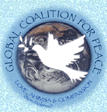 |
 |
 |
A NEW ECONOMIC PARADIGM FOR A CULTURE OF PEACE
 |
 |
 |
 |
 |
 |
|
High-level representatives from nine major world religions meet with the president of the World Bank to discuss religion and development; a new factor in project assessment
LONDON - As the head of the world's largest economic development agency, James Wolfensohn is an extraordinarily busy man. Since becoming president of the World Bank some two and a half years ago, he has visited more than 60 countries, meeting with heads of state and government, top national banking officials and representatives from leading non-governmental organizations.
So it is in all respects exceptional that Mr. Wolfensohn spent nearly
two days meeting with spiritual leaders from nine major world religions
in February, exploring topics that are seemingly unrelated to international
finance - such as how spiritual and material development are interrelated
and how the Bank and the religions might forge a new relationship to help
tackle the problems of global poverty.
"For a man like Wolfensohn, nothing is as important as his time,"
said Dr. Thomas Lachs, a former director of the Bank of Austria, who was
at the meeting as a representative of the Reform Jewish community. "So
I found it quite remarkable that he took two days for this conference,
and consider it a sign of the importance he attaches to such things."
By all accounts, too, the meeting itself was quite extraordinary. Convened
by Mr. Wolfensohn and the Archbishop of Canterbury, George Carey, the
event - known officially as the World Faiths and Development Dialogue
- was held in London 18-19 February 1998 at the Archbishop's 800-year-old
residence, Lambeth Palace. The gathering resulted in a series of ground-breaking
ideas and initiatives that could significantly reshape the field of international
economic development, say those who were involved.
"For the first time in contemporary economics, the role of religion
in development was not just publicly acknowledged or even acclaimed, but
brought into a partnership with one of the largest and, some would argue,
most vociferously secular organizations in the world," said Martin
Palmer, director of the International Consultancy on Religion, Education
and Culture (ICOREC), which played a key role in organizing the Dialogue.
"The repercussions of this are that the economic world will have
to take religion seriously - and vice versa." In particular, said
participants, the meeting gave high-level endorsement to the idea that
true development cannot take place without the proper consideration of
spirituality in the lives of individuals and communities.
As Mr. Wolfensohn himself said in a closing statement: "What is clear
is that what has come out of this meeting is that there is a unity between
us. A unity of the concern for physical livelihood but also spiritual
and cultural continuity and I think it is that which certainly I have
found remarkable at this meeting. There has been a total meeting of minds
in terms of this linkage."
High-Level Representation
The representatives of the world's religions themselves came from perhaps
the highest level yet for such an interfaith conference. Included were
leaders from the Bahá'í Faith, Buddhism, Christianity, Hinduism,
Islam, Jainism, Judaism, Sikhism, and Taoism. Among them, they represented
the religious traditions followed by an estimated 3 billion people.
On the Bank's side, Mr. Wolfensohn himself was the main representative.
A former investment banker, Mr. Wolfensohn has during his tenure sought
to create new directions for the Bank, which has come under criticism
in recent years for, among other things, its emphasis on funding large
projects that some development specialists say are disconnected from the
needs of local people.